- Home
- Mark Pryor
The French Widow
The French Widow Read online
THE
FRENCH WIDOW
ALSO BY MARK PRYOR
The Bookseller
The Crypt Thief
The Blood Promise
The Button Man
The Reluctant Matador
The Paris Librarian
The Sorbonne Affair
The Book Artist
Hollow Man
Dominic
A Hugo Marston Novel
THE
FRENCH WIDOW
MARK PRYOR
Published 2020 by Seventh Street Books®
The French Widow. Copyright © 2020 by Mark Pryor. All rights reserved. No part of this publication may be reproduced, stored in a retrieval system, or transmitted in any form or by any means, digital, electronic, mechanical, photocopying, recording, or otherwise, or conveyed via the Internet or a website without prior written permission of the publisher, except in the case of brief quotations embodied in critical articles and reviews.
Cover image © Shutterstock
Cover design by Jennifer Do
Cover design © Start Science Fiction
This is a work of fiction. Characters, organizations, products, locales, and events portrayed in this novel either are products of the author’s imagination or are used fictitiously.
Trademarked names appear throughout this book. Start Science Fiction recognizes all registered trademarks, trademarks, and service marks mentioned in the text.
Inquiries should be addressed to Start Science Fiction
221 River Street
9th Floor
Hoboken, New Jersey 07030
PHONE: 212-431-5455
WWW.SEVENTHSTREETBOOKS.COM
10 9 8 7 6 5 4 3 2 1
ISBN 978-1-64506-023-9 (paperback)
ISBN 978-1-64506-030-7 (Ebook)
Printed in the United States of America
This book is for Romano, the newest member of the Pryor family.
Illustration by James Ziskin
CHAPTER ONE
THE KILLER
The outskirts of Paris glide past my train window, filling it with concrete apartment blocks and warehouses interspersed with streets of cramped, brick row houses. Streaks of rain cut jagged paths through the grime and I wish they wouldn’t, because I don’t like to see this part of the city. Not just because it’s ugly.
The city’s heartbeat is the River Seine, which brings tourists, products, services, everything you need to live, it brings it all to and through the very center of the city. Tourists, too. And lovers foreign and domestic, all are drawn to the water like mosquitoes to a stagnant pond, they hold hands and gaze at the river, hang those stupid padlocks of love on its bridges. There’s not a romance born or experienced in this city that hasn’t involved a picnic by the river, or a soulful gaze over its sparkling waters at night.
On the flip side, fifty bodies are dragged out of the River Seine every year, in Paris alone. One a week. How many float through unnoticed, or sink to the bottom, never to be seen again? How many people are chopped into pieces and devoured by fish before they can be found and pieced back together? Probably not too many of the latter, but my point stands: the River Seine is death soup, it’s body broth. Well, it’s cold in there so maybe it’s ghastly gazpacho, but you get the point.
If you don’t, let me repeat: things are not what they seem. The same way people aren’t. And as I cruise into the city center to take up my old room in my beautiful old house for a week, these graffiti-spattered warehouses and trash-filled alleys cut a little close to the bone. You’d never guess by looking at me that I’m planning something awful. Evil even. But I am, and the wheels have been turning for a while.
Is it better or worse when you do it to your own family as opposed to a stranger, I wonder? If they deserve it, like in my case, then it has to be better. Strangers never deserve anything because, well, they’re strangers.
I checked my Rolex, a gold beauty that my father left me before he popped his clogs. I was impatient to be at the station, but then patience has never been a virtue for me. A momentary reflection in the window showed a few hairs out of place so I pulled the comb from my jacket pocket and rectified the mess, and then spent a few seconds staring at the woman three rows ahead of me, but facing me across her table, just to make her uncomfortable. I don’t do well when I’m bored.
Fifteen minutes later a limousine driver waited with my name on his iPad, and I gave him a frown because they used to hold pieces of paper with my name on it, which I preferred. I dropped my bags at his feet and let him figure out what to do with his iPad and two heavy suitcases as I walked out to the car.
“In town for long?” he asked, once he’d buckled himself into his seat.
“A week. Family reunion, of sorts.”
“Those can be fun, or . . .”
“Fucking awful,” I said with a smile, watching his eyes in the rear-view mirror.
“Well, I didn’t want to say that, but . . . yes.”
“This one will be fun, I think.”
He looked down, and then back at me. “The address I have, it’s Château Lambourd. Is that right?” He sounded perplexed, and I knew why.
“Yes, that’s right.”
“Oh. I thought it was a museum now, just open to visitors. I live a few streets away, you see.”
“A museum, yes. But every year we have a family gathering and a party for Bastille Day.”
“So, does that mean you’re . . .”
“Yes, part of the Lambourd family.” This was beginning to get tiresome.
His head nodded for longer than it should, and then he said, “Do you mind if I ask, is the legend true?”
I sighed loudly. “A legend is a story popularly regarded as historical but generally not authenticated. The story of my family is not a legend, it’s . . . a story.”
“A true one?”
I gave him an enigmatic smile, having learned that people loved to hang on to a little mystery in their lives. I didn’t want to dispel the romance around the myth of my family by making it real for him, cementing its truthfulness so he could do the same for anyone he cared to tell.
Thing being, the story is true. And it’s a good one.
CHAPTER TWO
Hugo Marston sat in his office with both feet on the desk, admiring the tops of his oldest pair of Tony Lama boots. He’d bought them in Fort Worth two decades previously, and they were in that delightful stage between new and decrepit, a stage that would last another ten years at least. They’d seen so much wear and so many buffings that they seemed to gleam from within, the cracks and creases adding character in the same way that wrinkles change the face of an aging, but still beautiful, movie star.
Hugo’s secretary, Emma, appeared in the open doorway with a mug of coffee in her hand.
“You made me a second cup?” he asked.
“What? No, this is mine.”
“Tease.”
“Did you hear from the ambassador this morning?”
“No. Something going on?”
“He’s trying to decide whether to go to a party on Bastille night.”
“I doubt he’d ask my advice on that,” Hugo said.
Emma smiled. “Right. Because if it involves you having to go, too, your advice would be against attending.”
“Precisely.”
“You don’t even want to know where the party is?”
“I do not.”
“Not even a little curious?” Emma pressed.
“No, and I’ll tell you why. No matter how impressive the building, whether it’s a château or the finest hotel, once you’re inside it’s the same thing. Rich people in expensive clothes guzzling champagne and trying not to make it obvious how many canapés they’re stuffing into their wealthy
gullets.”
“Hugo, be nice.”
“And as the evening progresses, the same one or two people will consume just a little too much bubbly and start acting crazy until their significant other drags them out to the Mercedes and drives them home. And that’s happening at an embassy party, a fashion after-party, and a Christmas party. Especially a Bastille Day party.”
“You’re like the Grinch, you know that?”
“Not at all,” Hugo said. “Those people are welcome to get their fun that way, I wouldn’t stop them.”
“You just don’t want to see it.”
“Correct.”
“Well, then. I’ll be sure and tell the ambassador not to ask your opinion.” She turned to go, looking over her shoulder to say, “Although this party’s at Château Lambourd.”
“Lambourd . . .” Hugo swung his boots off the desk. “Why do I know that name?”
“Because of that book I keep telling you to read. If you’d put down your mystery novels for a moment and read some Paris history, you’d know all about it.”
“Right, right, the Jewish family. The place is a museum.”
Emma sighed and turned back to Hugo, hesitating a moment before walking into his office and settling into a chair opposite him.
“Yes,” she said. “Most of the year it’s a museum. But that’s not the interesting thing.”
“Tell me.”
“You mean, remind you.”
“Yeah, that.” Hugo gave her his most innocent smile. “I think it was around 1890 when it all started.”
“I do enjoy story time,” Hugo said. He swung his boots back onto the desk, but Emma swatted them back down.
“That’s rude when you have a guest in here.”
“You’re an employee, not a guest.”
“That’s rude, too.”
“I was just trying to get comfortable.”
“Do you want to hear this story or not?” she asked.
“Is there murder and intrigue in it?”
“Oh, yes.” Emma smiled. “Aplenty.”
“Then by all means, proceed. Please.”
“It was in 1890 that Nissim Lambourd moved here from Algeria, where he’d made his fortune selling silks and other cloths. He bought land beside Parc Monceau and designed Château Lambourd himself, with help from an architect friend. He lived there with his wife, Beatrice, and their son, Guillaume. Eventually, Guillaume inherited the place when his parents died, and had two children with his wife, whose name I forget. Alice maybe.”
This isn’t the most compelling story I’ve heard, Emma.” Hugo shrugged. “I mean, lineage stuff? I was promised murder.”
“Hush, it gets better. So, Guillaume and Alice’s kids were Alexandre and Charlotte.”
“Oh, yes, that’s a great improvement. Do tell me about their kids, please.”
“I will. But not yet. Because what’s interesting about Alexandre was that he was a fighter pilot in the Second World War. Only he was killed, in 1943.”
“How? France was out of the war at that point.”
“He flew for the British. Meanwhile, his sister and parents were living at Château Lambourd, only the Germans had their eyes on the place.”
“Of course, lovely house, great setting. Perfect place for some German efficiency to be installed.”
“Not just that,” Emma said. “The Lambourds were Jewish.”
“Ah, right.”
“Yes. And they saw the writing on the wall so they packed Charlotte off to Luxembourg under a false name, with falsified papers and quite a lot of their belongings. There, she married some banker.”
“How old was she?”
“Seventeen or eighteen,” Emma said. “While she was safely out of the country, sure enough the Germans took over the house and both her parents, who’d refused to leave, were sent to concentration camps.”
“Did they survive?” Hugo asked.
“Sadly, no. But this is where it gets good.”
“Finally.”
She ignored the sarcasm. “Immediately after the war, Charlotte came back to Paris with her husband.”
“Looking to reclaim the château, I presume.”
“Right. Only, she couldn’t prove who she was because her family had destroyed any record of her, to protect her in case the Germans caught her while fleeing. And of course the parents were dead so they couldn’t speak up.”
“She was stuck with her false name,” Hugo said.
“Very much so. And while a few friends in Paris tried to help, the lack of paperwork did her in. And, of course, the new owner of the house was wealthy and influential enough to block her claim.”
“So what happened?”
“I’m glad you asked.” Emma gave him a wicked smile. “Her banker husband, the one from Luxembourg, was found dead in Parc Monceau.”
“Murdered? You did promise me a murder.”
“Unless he stabbed himself in the back and slashed his own throat . . .”
“Let me guess,” Hugo said. “No one was ever caught.”
“Correct. And within the year, our merry widow was married to the owner of Château Lambourd.”
“Didn’t waste any time, did she?”
“There wasn’t much to waste,” Emma said.
“Meaning?”
“He was rich man, at least twice her age,” she said.
“Married him for his looks and vitality then.”
“Well, he was vital enough,” Emma said primly. “She was in her forties but they had four children. Although I think the last one was adopted.”
“Impressive. Who owns the house now? One of them, I assume.”
“Nope.” Emma stood. “Charlotte is still alive. A widow once again, she owns it and it’s her party the ambassador has been invited to.”
“She’s alive?” Hugo’s eyes lit up. “How old is she?”
“Midnineties, I suppose. Still formidable, although she has a live-in nurse.” Emma smiled. “You should go, maybe you could get her to confess to murdering her first husband.”
“What about her second? Was that a suspicious death?”
“No idea. You can investigate that, too.”
“Maybe I should.” Hugo nodded slowly, deep in thought. “The black widow of Parc Monceau. That’d be quite something, wouldn’t it?”
Four hours later, Hugo powered down his computer, stood up, and stretched out his lower back. He was up to date with returning emails and other pending tasks, and was ready for a glass of wine. He stepped out of the embassy to begin his walk home, and looked up at a blue sky he’d not seen all day. The usual July heat had been swept out of Paris by a cool front from the east, one that had sprinkled the city with raindrops for a couple of days before leaving behind a picture-perfect day. He strolled down Avenue Gabriel toward the expanse of parkland that would lead him toward the Louvre and, eventually, a nice glass of wine.
As he walked, his mind turned to the story Emma had told him. In truth, Hugo was not one for parties, especially formal ones, but he was a sucker for history, and a complete and total sucker for an historical murder mystery. He took out his phone and called the one person who might know more than Emma about the Lambourd story.
Her voice sounded strained when she answered. “Hugo, how’re you?”
“Fine. You?”
“Busy wrapping up a story. My editor had a few changes she wanted so we’ve just finished fighting about that.”
“Who won?”
“She did.”
“Really? That surprises me.”
“She’s good at what she does and I trust her judgment,” Claudia said matter-of-factly. “What’s going on with you?”
“Wondered if you had time to share a carafe of cheap wine with me.”
“You know perfectly well I don’t drink cheap wine.”
It was true. Born Claudia de Roussillon, she used the name Claudia Roux for her newspaper and magazine bylines to avoid the appearance of cashing in on her blue blood and distin
ctive name. But despite her honest and humble intentions, she’d been unable to shake her upbringing—her first glass of port at the age of sixteen had been a 1963 Cockburns, her first glass of red wine a 1947 Pétrus, and her first (and only) car: a bullet-proof Mercedes with a driver. Cheap hotels, economy-class flights, and the thin house wine served by so many bars and cafés were not things she endured, Hugo well knew. Not out of snobbery, but habit and custom. “If I don’t have to, why would I?” she’d once asked him, and he had no good answer.
Hugo named a café close to his apartment in Rue Jacob, in the Sixth Arrondissement of Paris, and she said she’d beat him there. He smiled at her competitive nature and hung up, but noticed he’d quickened his own stride subconsciously. He slowed, and reminded himself that this was his commute to and from work, a stroll through the ever-changing royal garden of the Tuileries.
On this evening, several families were taking advantage of the cooler weather to lay out blankets for picnics. One of those families, a husband and wife with two smartly dressed children, knelt on a dark red blanket in a circle, holding hands and their heads bent in prayer. Not far from them, an overweight father kicked a soccer ball with his toddler, who was dressed in the blue and white of the national team.
Hugo had just passed the Musée de l’Orangerie, and vowed to himself yet again to stop in one day and admire the Impressionist paintings it housed, when he heard two popping sounds ahead. A little early for Bastille Day fireworks, he thought.
Seconds later the rising swell of shouts and screams reached him, and when he heard three more pops he knew they weren’t firecrackers. Instinctively he started running. As he did so he reached for the gun tucked under his arm, freeing it from the holster and holding it with both hands, barrel pointed to the sandy walkway. His eyes scanned ahead, past the people who were staring in disbelief, and past those who understood what they were seeing and were scattering in all directions.
And then Hugo spotted him. He was sixty yards ahead and to the left, a burly young man wearing a tattered jacket and with an army-green pack on his back. He had a pistol in each hand and stood looking down at one of them, shaking it as if it’d jammed. Hugo sped up, raising his own pistol, watching the man but also angling his run so that there was no one behind him.

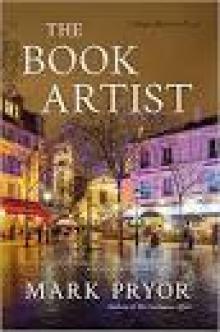 The Book Artist
The Book Artist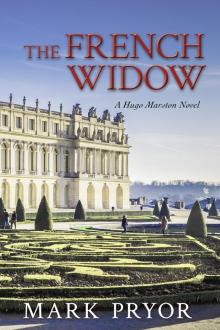 The French Widow
The French Widow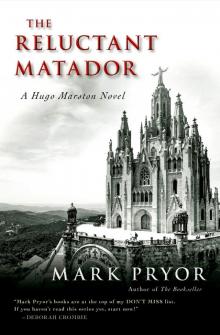 Hugo Marston 04 - The Reluctant Matador
Hugo Marston 04 - The Reluctant Matador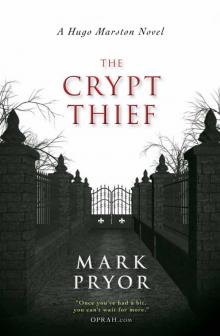 The Crypt Thief
The Crypt Thief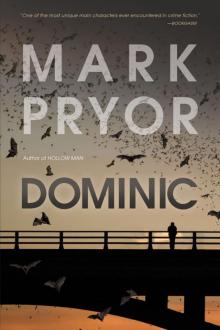 Dominic
Dominic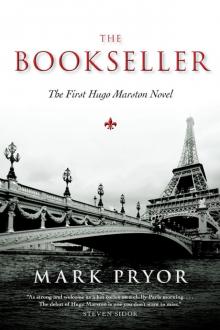 The Bookseller
The Bookseller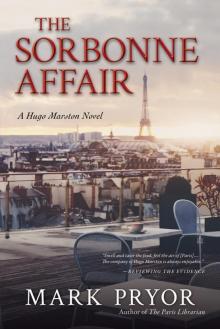 The Sorbonne Affair
The Sorbonne Affair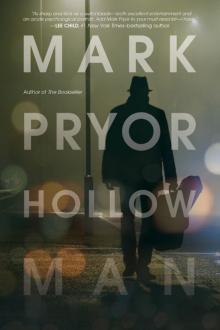 Hollow Man
Hollow Man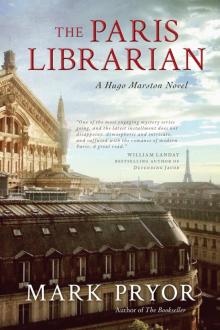 The Paris Librarian
The Paris Librarian